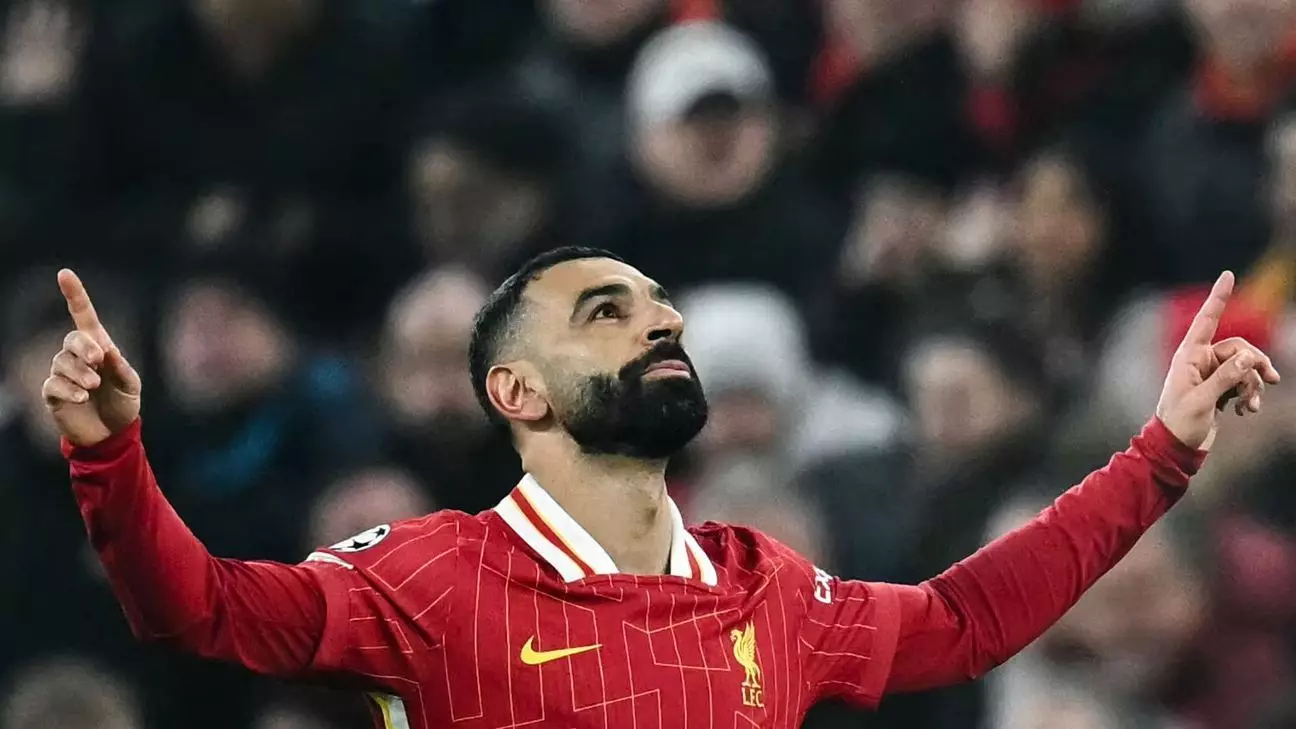The build-up to Liverpool’s UEFA Champions League match against Lille was fraught with debate and opinion, much of it centered around one player: Mohamed Salah. In the hours leading up to the game, Curtis Jones, a young Liverpool midfielder, ignited discussions among fans and pundits alike when he posited during an interview that Chelsea’s Eden Hazard was the superior footballer compared to Salah. This comment was met with uproar from Salah’s supporters, who rallied to defend their star forward. Amidst this backdrop of rivalry and skepticism, Salah transformed the conversation from mere speculation to irrefutable proof of his prowess on the pitch.
Within just 34 minutes of the match, Salah silenced critics and reaffirmed his status as a critical player for Liverpool. He scored the opening goal with remarkable finesse, stunning the Lille defense after receiving a perfectly timed through-ball from Jones. This moment not only showcased Salah’s individual skill but also highlighted the tactical brilliance of Liverpool’s playing style under the leadership of their manager. The goal came to symbolize a triumph not only for Salah but for the entire team, solidifying their rank as one of Europe’s elite clubs.
The atmosphere in Anfield was electric as Lille’s supporters entered the stadium with high hopes, brandishing scarves and igniting flares. Yet, as the match progressed, it became apparent that their optimism would be met with resilience. Bruno Genesio’s charges had been undefeated in their previous 21 matches, but Salah’s brilliance disrupted Lille’s defensive stoutness and ultimately led to their demise.
Salah’s goal represented a significant milestone—his 50th European goal for Liverpool. This achievement is not merely a statistic but a testament to his consistency and influence in European competitions. After scoring, Salah reveled in the admiration of fans, a picture of bliss among the club’s faithful. Such personal triumphs, however, are intertwined with the team’s overall success. Salah demonstrated he still possesses the prowess to dictate the momentum of games, leaving defenders scrambling to contain his attacking flair.
His performance throughout the match was noteworthy. Salah could have easily netted a hat trick, demonstrating a hunger and threat that few can match. He repeatedly tested Lille’s goalkeeper Lucas Chevalier, curling in shots and creating opportunities for teammates. Each potential goal served to reaffirm the forward’s elite status and importance to Liverpool’s attacking strategy.
The game took an unexpected turn when Lille’s Jonathan David equalized in the 62nd minute, but Liverpool responded rapidly. The decisive moment arose with Harvey Elliott finding the back of the net, striking the ball just moments after Lille was reduced to ten men. Elliott’s goal not only reinstated Liverpool’s lead but also revealed the unpredictable nature of football, where fortunes can change in mere seconds.
Liverpool’s defensive record also became a focal point of conversation, as the club established a new record for the longest time without conceding a goal in European competition this season, surpassing a benchmark set in the 2005-06 campaign. This defensive stability is a crucial component of their game plan, underscoring how cohesive teamwork can lead to collective achievements.
Yet, amid all these accomplishments lies an underlying concern regarding Salah’s future—his current contract is set to expire in the summer. With looming uncertainties surrounding his next steps, discussions have arisen about the profound implications of his potential departure. Salah’s value extends beyond mere statistics; he embodies the spirit and ambition of Liverpool Football Club. As discussions about contracts and future plans circulate, both fans and management must act urgently to ensure that Salah continues to don the Liverpool jersey for years to come.
In the post-match interviews, Slot, Liverpool’s manager, lauded Salah’s contributions, emphasizing that the word “special” encapsulates his performances over the years. This sentiment echoes the feelings of Liverpool’s supporters—Salah is not just a player; he is a central figure in the club’s narrative. Protecting his future is not only beneficial for Salah but crucial for maintaining Liverpool’s competitive edge in domestic and European football.
As Salah continues to redefine excellence on the pitch, the debate regarding his status among the game’s greats will persist. Yet, one fact remains indisputable: Liverpool needs Mohamed Salah as much as he needs Liverpool. As the season progresses, the hope for both fans and management is to see Salah firmly tied to the club, continuing to build a legacy that will be remembered for generations in both Anfield and the wide world of football.

